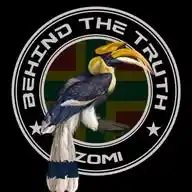
𝔹𝔼ℍ𝕀ℕ𝔻 𝕋ℍ𝔼 𝕋ℝ𝕌𝕋ℍ (𝔹𝕋𝕋)
February 10, 2025 at 06:11 AM
*Week 3 Reflection: Conflict and Continuity – A Story of Fragmentation and Resistance*
As we close Week 3, the *Zomi experience emerges as a story of conflict, survival, and unrelenting resistance.* From signing the *Panglong Agreement*, which promised autonomy but delivered betrayal, to the colonial-era *borders that fractured a once-unified people*, the Zomi have endured forces far beyond their control—only to emerge as a people who refuse to disappear.
The *arbitrary borders* drawn by British administrators were never meant to reflect the reality of the Zomi homeland. They were *bureaucratic decisions, lines etched in colonial offices*, disregarding the kinship, language, and shared histories that bound the Zomi together. “*We did not cross the border—the border crossed us*” became more than just a phrase; it became a painful truth as the *Zomi found themselves torn between India and Myanmar, marginalized in both nations*.
Yet, despite these divisions, the Zomi have never stopped fighting for *recognition and self-determination*. Whether through *political movements, armed resistance, or cultural revival efforts*, the Zomi have sought to reclaim their narrative, demanding the dignity denied to them for generations. But the struggle is no longer just physical—it has entered the digital age.
On *Day 21*, we explored the *digital frontier*, where the Zomi identity faces new threats. The internet, once seen as a tool for unifying transborder communities, has become another battleground. *Instead of promoting solidarity, platforms like WhatsApp channels have deepened ideological divides*, while dominant digital languages continue to erase Zomi voices. The fight for identity is no longer just about land—it is about *representation, visibility, and survival in an increasingly globalized world*.
*Week 3 was not just a history lesson; it was a concrete reminder of how fragile identity can be in the face of systemic erasure. But if history has shown us anything, it is that the Zomi are not a people who disappear*.
*Looking Ahead: Week 4 – What It Means to Be Zomi Today*
*In Week 4*, we shift our focus from the past to the present—and the future. If Week 3 was about *conflict and survival*, Week 4 is about *identity and continuity*. What does it mean to be Zomi in today’s world? How do the younger generations balance tradition and modernity? What does *cultural preservation look like in a time of rapid globalization?*
We begin with *Zomi on the Global Stage*—highlighting the contributions of Zomi individuals to global movements and ideas. From there, we examine the challenges of *cultural preservation*, the *role of language, and the delicate act of balancing tradition with modernity*. We will also explore cross-border solidarity, the impact of *Zomi youth, and what history teaches us about resilience*.
The next chapter begins now. *What does it mean to be Zomi in the 21st century?* Join us as we find out.
BTT
🔴🟡🟢
https://whatsapp.com/channel/0029VaYCqe71yT229xZ6f42y
❤️
👍
😂
🙏
27